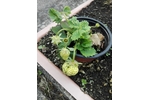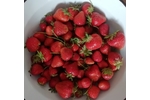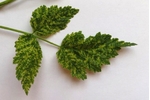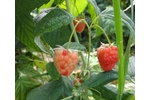Can we taste strawberries and raspberries without viruses?
Which viruses are harmful to strawberries and raspberries? What are the ways to protect the plants, and how can healthy seedlings be grown and kept? These are some of the questions the scientists and growers from the Czech Republic and Norway have set out to answer. The results of a three-year international project, coordinated by virologists from the Biology Centre CAS, will not only help strawberry and raspberry growers, but also gardeners and consumers, and lastly will expand scientific knowledge.
Strawberries and raspberries are among the most popular small fruits. However, they quite often suffer from various diseases that afflict not only large-scale growers but also gardeners. There are currently over 30 known viruses affecting strawberries and raspberries. “Some of them cause serious diseases, others can be symptomatic only in combination with other viruses, while some may have no impact at all,” clarifies Jana Fránová, coordinator and lead researcher of the project. “Causal agents of some strawberry and raspberry diseases are yet to be identified, and little is known also about the insect species that transmit the viruses,” she added, explaining that all these diseases affect the growing and maintaining of healthy mother stock, and consequently the quality and quantity of produced fruits.
Therefore, the identification of all known and unknown viruses using the latest molecular methods is one of the first tasks of the international three-year project TAČR-KAPPA. The project involves plant virologists from the Institute of Plant Molecular Biology – Biology Centre CAS, together with their colleagues from the Crop Research Institute in Prague, the Research and Breeding Institute of Pomology in Holovousy, and the Norwegian Institute of Bioeconomy Research (NIBIO). Cooperating with the scientific team are also practical users of the results, such as breeders and plant propagators in the Czech Republic (Jan Holub, s. r.o.) and in Norway (Graminor, Sagaplant), and finally a Norwegian company specialising in cryopreservation (GenEver).
The researchers will monitor the viruses in production fields and plant breeding stock, investigate which insect species (and other potential virus vectors) contribute to the spread of the viruses. The project also addresses the new biotechnological method of eradicating viruses by so-called cryoknife, and the preserving of healthy, virus-free mother plants through cryopreservation. Cryopreservation will also be used for preservation of virus isolates for further research. “Currently, the project is in its initial phase, and the whole team is evaluating the findings of the first-year virus isolates and related insect samples,” specifies dr. Fránová. “The results from this research should not only help to expand scientific knowledge about viruses and vectors, but also be useful for growers, gardeners, and strawberry and raspberry lovers.” she adds.
The project „Healthy berries in a changing climate: development of new biotechnological procedures for virus diagnostics, vector studies, elimination and safe preservation of strawberry and raspberry“ benefits from a € 1,430,000 grant from Iceland, Liechtenstein and Norway through the EEA Grants and Technology agency of the Czech Republic within the KAPPA Programme. The aim of the project is to increase the production potential of berries in a new and challenging climate by using high-quality virus-tested mother plants, improving virus control approaches, well-study of associated vectors, and better safeguarding of valuable plant germplasm and plant health.

















